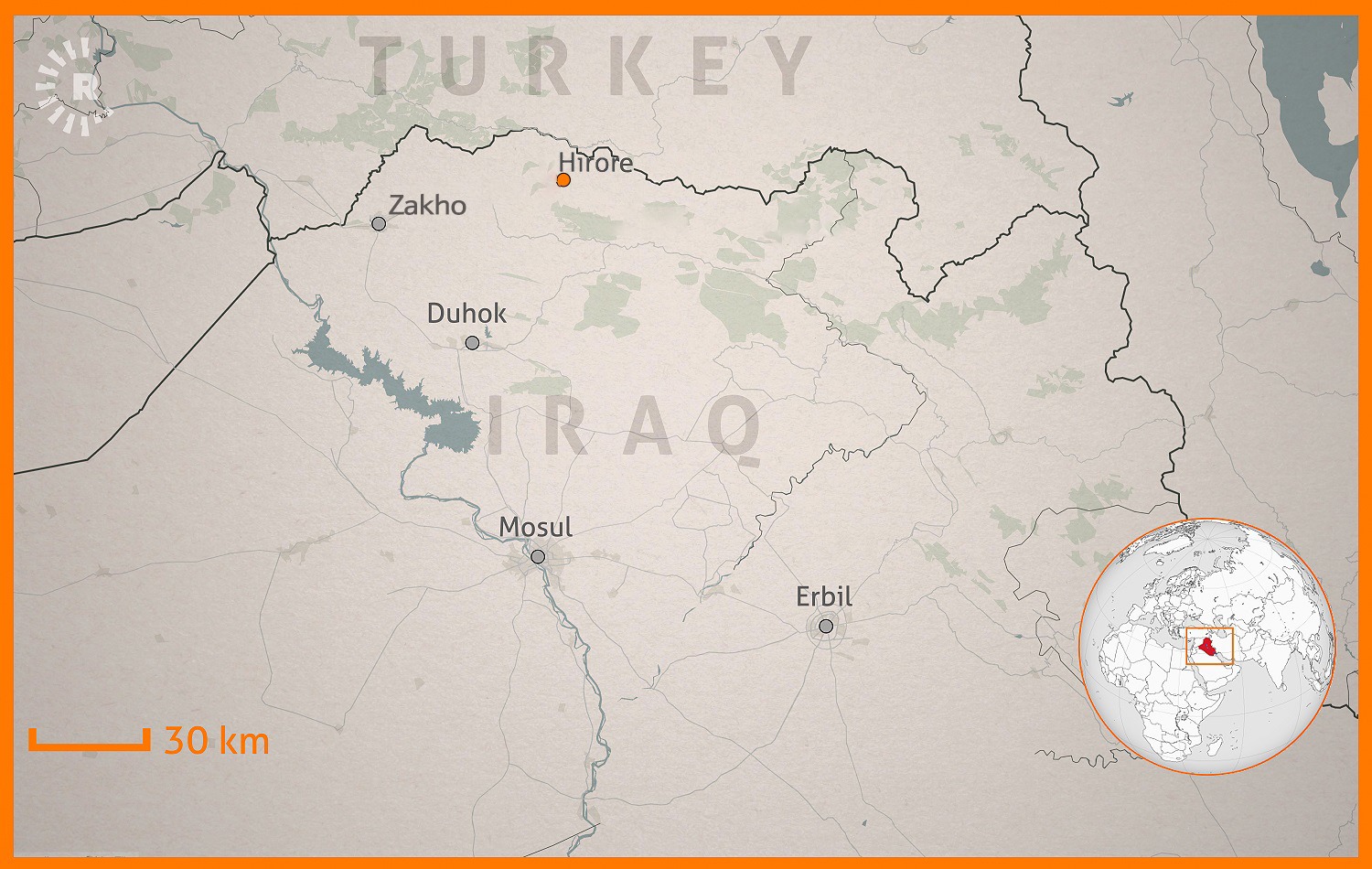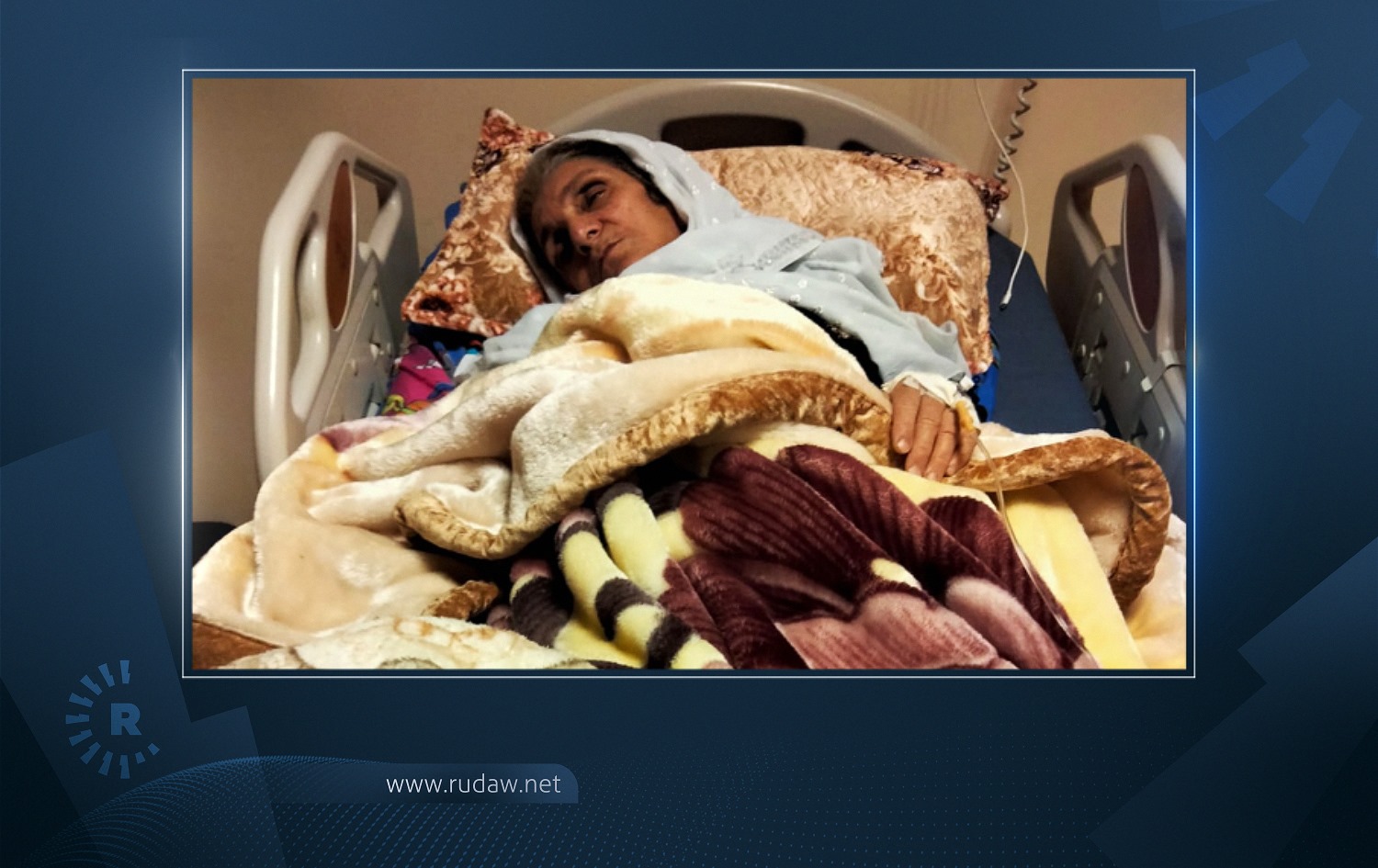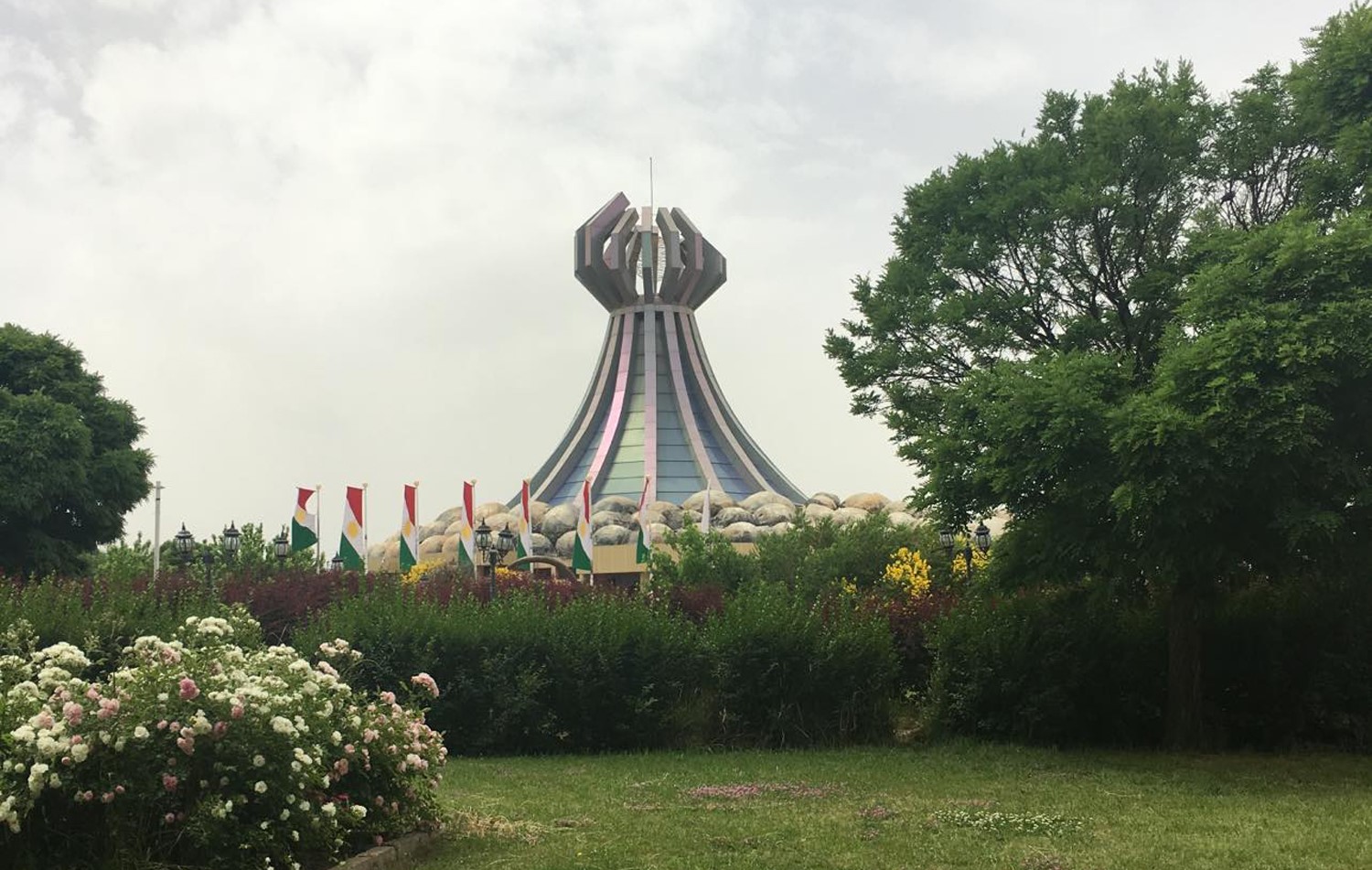
Hadiya Mustafa receives treatment in Kani Masi after a suspected chemical weapon attack on September 4, 2021. Photo: Rudaw
Abdullah Hassan, 76, is a former Peshmerga. He lives with his wife and daughter in the small village of Hirore. Nestled in a valley in mountainous northern Duhok province, most residents live off their orchards. On September 4, Hassan and his family went outside in the late afternoon to take in the fresh air.
They heard the sounds of airstrikes on the hilltop that looks over their home. The village of Hirore had been on the frontline of a conflict between Turkey and the Kurdistan Workers’ Party (PKK) for months and the family was becoming used to the sounds of war. But this day was different.
At 6:45pm, moments after hearing a bomb that was quieter than the others, Hassan saw a cloud of grey smoke rushing towards him. He cried out to his daughter, who was on the roof, to get inside fast. He and his wife were already running indoors.
“Come down! We have been exposed to a chemical bomb,” he yelled to his 28-year-old daughter, Zhiman. Hassan knew what he was seeing - he took a 15-day training course on how to respond to chemical weapons when he was a Peshmerga decades ago.
Soon they all started to cough and their eyes burned. An ambulance took them to the nearby Rozana health center, but the clinic didn’t have the resources to treat the family so they were moved to Zakho town’s emergency hospital. The family has been suffering from symptoms of coughing, difficulty breathing, burning and watering eyes since then.
The PKK is an armed group fighting for the increased rights of Kurds in Turkey. Ankara considers it a terrorist organization and frequently targets its positions in the Kurdistan Region. Turkey launched twin operations against the PKK in late April, using fighter jets, drones, and artillery to pound alleged PKK positions in northern Duhok province.
Hirore used to be home to nearly 300 families, but now just 50 are still living there. The others left because of Turkey’s regular shelling. Hassan’s house is on the outskirts of the village, isolated from his neighbours. The family has been impacted by Turkey’s military campaign several times before. They narrowly survived a Turkish bombardment in late June when shrapnel hit the front of their house.
On September 4, six bombs fell just one to two kilometers away from their home. Adeeb Mousa lives in the same village where he works as a farmer. He told Rudaw at the time that six bombs landed in the vicinity of the village and one of them “produced a black smoke” that spread to Hassan’s house. The others emitted a yellow smoke.
“The bomb hit a distant place but the smoke came toward our house fast. We felt nauseous,” Hassan recounted to Rudaw English on the phone. He was treated and discharged from hospital, but said he still has the same symptoms. The smoke “smelled like tar,” he said.
“I do not even feel I have a head”
The family is convinced that they were exposed to some kind of gas, but local authorities say it is too early to determine what caused their illness. Health authorities say they do not have the necessary equipment to test for chemical compounds. What tests they have done, they have not released results to the family.
Hassan believes the doctors are afraid to acknowledge what really happened. “The doctors fear speaking about this,” he said.
“My wife still feels nauseous. She feels dizzy too,” Hassan said on the phone before he was interrupted by the sound of a bomb. He briefly paused, saying, “Did you hear that? Another bomb hit here,” and then continued.
“Tears constantly come from our eyes and we cannot breathe well, but thanks to God for keeping us alive. We cannot sleep at night,” he said, adding, “I do not even feel I have a head.”
Dr. Rasul Mohammed, who first treated the family, told Rudaw English that “Tears came from their eyes, and they also had breathing problems and felt dizzy.”
He couldn't confirm if it was a chemical attack, but said the symptoms were unusual.

Officials are reluctant to publicly reach any conclusions. Zakho’s health directorate cannot conclude whether it was a chemical attack or not, and they are not willing to investigate it, said Amir Ali, head of the directorate’s media office. Sarbast Akreyi, mayor of Kani Masi, which includes Hirore, said they do not have access to files related to the incident because the family was treated in Zakho.
Hassan is not happy with the lack of information from the authorities on the one hand, while on the other they instruct him not to eat thin-skinned food grown on his land as it could be poisonous.
“The doctors asked us not to eat anything from the farm except for walnuts and pomegranates,” he said, suspecting that the doctors are hiding something from him. “If it was not a chemical substance, the doctors would allow us to eat our produce.”
Ali from the health directorate denied such instructions had been given, but Azad Adeeb, chieftain of Hirore, confirmed it.
The PKK has claimed several times recently that Turkey used gas against its fighters in the Kurdistan Region, increasingly so this year. They have not, however, reported the chemical attack on Hassan and his family. The PKK’s armed wing, People's Defense Forces (HPG), said in a statement on September 5 that Turkey attacked Hirore village the previous day “with howitzers and mortars fired from the outposts.” It did not mention any chemical attack.
Rudaw English reached out to the Turkish government, but it is yet to respond.
Turkey was accused of using a chemical weapon against Syrian Kurds in October 2019. Mohammed Hamid, who was 13 at the time, was left with burns to 70 percent of his body and had to receive medical treatment in France. Ankara denied it.
“We believe it is a chemical attack”
An advocacy group believes it was a chemical weapon attack.
Christian Peacemaker Teams (CPT), which describes itself as “an international violence-reduction and human rights organization,” closely monitors Turkey’s military activity in the Kurdistan Region.
“From the information we have gathered we believe it is a chemical attack,” CPT said via email, adding this is not the first time Ankara is accused of using a chemical weapon in the Kurdistan Region.
“We have heard that Turkey used chemical weapons multiple times in abandoned areas in Avashin especially in Ars Fars village, but unfortunately because of security concerns and the lack of support from local authorities we have not been able to visit the area and confirm these reports,” they stated.

CPT believes it would be possible to confirm if a chemical weapon was used on September 4, if they can coordinate with local authorities.
“With the local authorities helping us, yes it would be possible to confirm. One of the current problems is that the medical team treating the family did not do a proper investigation into the cause of their symptoms. Another problem is that there has been no attempt by local authorities to have soil samples taken from the site,” CPT said in an email.
They are in contact with the family and plan to visit them at the end of the month or early October.
Reving Hirori is a member of the Kurdistan Parliament. He is from the village and has been the voice of its residents since Turkey’s bombardments of the village increased this year.
The MP told Rudaw English that he has closely followed the case of the family, speaking to several local authorities and doctors who say they are not qualified to investigate the case.
“The only solution is the formation of a specialized committee,” he said. But that is not straightforward. “Sending a delegation there requires the approval of Turkey and the PKK. It is a war zone, so no one can check it.”
Hirori noted that Hassan and his spouse had health issues before the bombing.
Halabja felt it
The people of Halabja suffered a chemical attack by the former Iraqi regime, led by dictator Saddam Hussein, in 1988, the last year of the eight-year war between Iraq and Iran. Thousands of people died immediately and others carried symptoms until their death.
Luqman Abdulqadir is one of the survivors and head of Halabja Chemical Victims Society, which calls for the recognition of the attack as genocide and punishment of the perpetrators and those who helped them. He told Rudaw English that they follow every chemical attack in the region and the world.

“We feel better than anyone what they feel,” he said of Hassan’s family, whose lives are irrevocably changed.
Hassan’s wife, Hadiya Mustafa, suffered a stroke late on Wednesday. She is in hospital, unable to speak clearly and her condition is not stable, their son Jihad told Rudaw English.
Whether what happened on September 4 was a chemical attack or not, Jihad said he has been told by doctors that his parents and sister “may suffer from symptoms forever.”









Comments
Rudaw moderates all comments submitted on our website. We welcome comments which are relevant to the article and encourage further discussion about the issues that matter to you. We also welcome constructive criticism about Rudaw.
To be approved for publication, however, your comments must meet our community guidelines.
We will not tolerate the following: profanity, threats, personal attacks, vulgarity, abuse (such as sexism, racism, homophobia or xenophobia), or commercial or personal promotion.
Comments that do not meet our guidelines will be rejected. Comments are not edited – they are either approved or rejected.
Post a comment